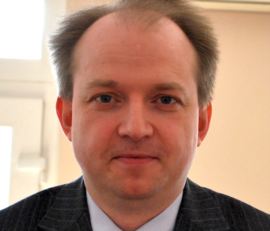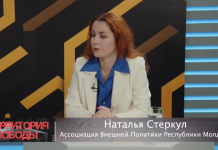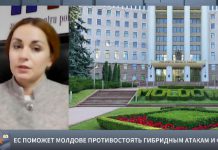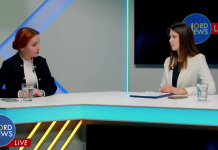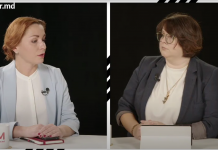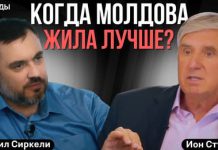Corneliu RUSNAC, moderator Imedia: Good day, dear listeners! I am Corneliu Rusnac and I welcome you to a new broadcast of discussions on topics of foreign policy, produced with the support of the „Foreign Policy Association” and financed by the „Friedrich Ebert” Foundation.
In today’s programme I would like to present some sound bites from discussions with two German experts Peter Schulze and Martin Sieg who recently visited R. Moldova at the invitation of the Foreign Policy Association. The two experts have good knowledge of Russian realities, but also of the ex-Soviet space and developments the Transnistrian conflict passed through. First, I asked Mr. Schulze which are currently the guiding principles that Germany follows when it comes to its relations with Russian Federation.
Peter SCHULZE: Regardless who is in power in Germany, we have since the Soviet times relatively strong consensus on how to deal with Russia and this consensus is shared among all parties in the German Parliament, in the Bundestag. The Consensus and the dealing with Russia are based and supported by strong influential groups in German Society, first of all the business community because the business community is quite actively involved in the Russian economic system. More than 6000 German entrepreneurs, industrialists work in Russia and they have an interest in improving the internal situation in Russia, so they are a kind of catalyst in Russia for more stable, maybe democratic, but definitely legal procedures. Within Germany they are forcing the political parties and the Government to stay away from ideologically charged positions in German policy. So, this is one very strong block, business orientation.
Secondly, we have experienced with German unification that Russia is a very important actor and player in European politics and you can do anything against or without Russia if you want to have a stable, peaceful, non-confrontational development in Europe. So, a policy against Russia is out of the question, a policy with Russia is very difficult, we all know. Nevertheless, we are trying and so far I think the relationship has worked quite well. Sometimes we are criticized by other European countries, especially the Poland or the Baltic states of being to pro Russians, but it is in our national interest because we are all struggling for a peaceful Europe, a Europe without conflicts and a Europe that should be composed out of member states which have cordial, friendly relations towards each other. Cooperation is better that confrontation, this is the principle.
Corneliu RUSNAC: How important is Meseberg initiative, an initiative that refers to a new security system on the European continent that would include Russia, for the Germany – Russia relations? What are the chances for the initiative to develop after presidential elections in Russia that could lead to a change of power? Peter Schulze:
Peter SCHULZE: The initiative will definitely continue the question is if we will have some progress in the initiative. The initiative was accepted by the Russian side and, of course, the whole leadership of Russia was involved in it so it doesnt make any difference if the new President is Putin or somebody else. Do not get fixated on the personality. Putin is just one figure, powerful, but just one figure. Russia is much more ruled by collective leadership. Meseberg itself came as a surprise, nobody thought about this. It was an act of the Chancellors office and it was not debated beforehand within the European community, but it was, I think the right step because it opened the doors to come to some foreign and security policy arrangement in the European Union vis-Ã -vis Russia. EU doesnt have such an institution, so it was an attempt basically to mirror what is existing in the NATO și Russian relations with NATO și Russian consultation body under European and Russian side. There is no much news about what is going on there, but it is an element which will continue, slowly, steady even successfully.
Corneliu RUSNAC: Mr. Peter Schulze said that the Meseberg initiative is an extremely broad one.
Peter SCHULZE: It is a very broad initiative because we have very intensive dialogue with Russia. Our Governments meet two times a year in summit meetings and all the Ministries are in permanent contact with Russian Ministries, not every Ministry, but most of them. Except that we have the business meetings, the meeting of elements of the civil societies which meet once a year in the so called St. Petersburg Dialogue Framework. This is taken care of. Meseberg has a grand design. Basically is connected to a new security and peace architecture of Europe, as Gorbaciov said a common home Europe”. This is an element driving and revitalizing the old common home Europe” again and this is, of course, the interest on the Russian side and the German side is not against this. It said ok, if we are supporting such an idea we have a couple of problems in Europe, one is Transnistria și Moldavia, why not try to solve the problem. So, it is a combination of large scale architecture and elements in very narrow regional problems.
Corneliu RUSNAC: Peter Schulze believes that Russia is sincerely willing to contribute to solving the Transnistrian crisis:
Peter SCHULZE: I dont think that Russia has much to gain from the situation here. There is no real conflict; there is a kind of a problem, huge problem. I do believe that Medvedev agreed in Meseberd with Merkel that we can solve the problem or we help to solve the problem better by influencing Tiraspol, to change the regime in order it to become more flexible, open, but please Merkel, Germany, Paris you have to do your business with Chisinau, with the politicians there. If they do not come together then there will be no agreement”. So, you have to give and you have to take and it is not only the Russians who have to give something, the West also has to do something here. The Russians would like to see a neutral Moldova, no NATO and no unification with Romania, which is very clear and of course, the cultural and language rights of the population in Transnistria should be absolutely secured. If this is the case I think that the willingness of Russia to go further will be given.
Corneliu RUSNAC: How does Germany sees the Eastern Partnership, a project designed for six former Soviet states including R. Moldova. Is this initiative a successful one? Peter Schulze:
Peter SCHULZE: We wish the initiative good luck, I should go ahead, but it should not be an instrument against Russia or against Germany. We dont have a special relation with Russia, but our relation is special and therefore we dont need elements of other strategies which are undermining our relationship. I would say that we are looking at it, nobody says anything bad about it, but it is basically a very week instrument. I mean, how many million of euros over 7 years divided by Caucasus countries, Belarus, Ukraine and Moldova.
Corneliu RUSNAC: Peter Schulze is sure that the Eastern Partnership will disappear:
Peter SCHULZE: No, it will not disappear because if people receive money they will ask for more money. I dont believe that it will develop because at the moment we have serious financial problems in the EU. So, for the next foreseeable 7 years there will be no increase in funding. If this initiative helps in stabilizing of why I call the Europe in between then, of course, it is a very good instrument, but if it is used in order to push Russia away from Europe then it is very negative. We want Russia to come in from the outside. Russia outside is to dangerous for us. Who knows what is going on there? There could be an imperialist, nationalist or whatever kind of development which then destroys our relationship, our peace and security. To bring it in is better then to leave it out.
Corneliu RUSNAC: In the context of the relations with Russia, but also of the transnistrian problem, another German expert, Martin Sieg says that during first stage we should not put too much hope in the talks regarding the conflict between Chisinau and Tiraspol, which could be restarted soon.
Martin SIEG: First of all it is important that the negotiations have been restarted as they have been interrupted since 2006. I think it is the first step; of course, the process now is more about procedure than substance. One must be careful. There is an open political situation in Chisinau, there is some kind of elections in Transnistria coming up and then we have in Russia again Presidential elections. Do not expect too much too early, in any case conflict resolution will require a long term commitment. The question here is what can the 5+2 here achieve? 5+2 cannot bring about, simply by diplomatic negotiations, a final settlement and probably not very soon. What 5+2 can achieve is probably to get in the next year some kind of agreement among all parties about general principle of how a settlement should look like, that would, of course, guarantee the territorial integrity of the R. Moldova, but moreover, must insure that a reunified Moldova would be a functional state.
Corneliu RUSNAC: What could be the leverages that would determine Transnistria to accept an agreement in this sense?
Martin SIEG: I have to admit that at this time a do not really see any line of compromise showing up in the process and that is why we have to talk about a process and it will be a long term process. It will be a process, first of all, to bring the societies closer to each other. Confidence building measures are particularly important in this respect and, of course, we should think about the requirements for a final settlement that may not be simply negotiated in diplomatic ways among the partners. There needs to be a political change on both sides of the country. Moldova needs to proceed with European integration. Here are many domestic reforms still necessary. The same thing goes for the other bank of the river. For what I see right now I can hardly imagine how the different political systems can work together in one common state. I have many difficulties to see how that could really work although that would be the functional state we would like to see. So, political change must emerge. It cannot be enforced upon the partners by the EU, but what we need is a strategy for engaging Transnistria and giving all (people including) the feeling that their interests are served. EU can work in some ways as some kind of guarantee. You know if you, for instance, wish to join the EU in the future, minority rights are a very important issue here. In this way giving the Transnistrians the feeling that their interests are served, that they will not be a side line province, that they have some guarantees against Unification with Romania, that the neutrality issue, for instance is solved in a satisfying way. These steps in itself will not bring about a final settlement, but will prepare the ground. The next probably few years of the negotiation process will be about the double check approach. First of all try to find as many compromises in the 5+2 format about the general principles of a settlement and then prepare between Moldova and Transnistria the ground for the final settlement. This ground is not here right now at this time, but with a strategy of engagement toward Transnistria there is a chance that it can actually be created.
Corneliu RUSNAC: How could currently be characterized R. Moldovas foreign policy? Martin Sieg:
Martin SIEG: First of all I think you have a very competent team in the foreign office. I think that the Ministry for Foreign Affairs and European integration does a great job with the EU. So, I have nothing to criticize in that respect, but foreign policy, of course, is not only about what the Foreign Ministry does. Generally it is quite important for Moldova, in particularly when it comes to conflict resolution and creating an international framework to achieve in its domestic policies a greater amount of coherence, you can call it stability or whatever you want. As long as nobody really knows, and that goes for all the partners in the negotiation process, for Russia, Transnistria, what kind of Government will be in place in Moldova over the next few months, how should they make up their minds, how should they define their own interests, very difficult. Next point which is important and will require time too is, of course, move forward with European integration. That again is not simply about negotiation with the EU, but it is mainly about implementing, about making the relevant parts of the aqui, of the common law of the EU part of Moldova. That is a long way, sometimes very difficult way and that is about domestic reforms in the end. If you, for instance, have achieved, signed the Free Trade Agreement with the EU which comes along with the Association Agreement, if you have actually implemented it then you can expect that every partner in the negotiation framework will understand that European integration is irreversible and that other option for the foreign policy orientation of Moldova are of the table. That makes it easier for Transnistria, for Russia for all parties involved to define their own interests because they know better what to expect from Moldova, on what track Moldova is going to. It is not only the question whether the foreign policy now in Moldova is doing a fine job, the Foreign Minister is doing a fine job, it is about continuity in that respect and backing up with domestic reforms.
Corneliu RUSNAC: Does R. Moldova have any chance to remain a success story of the EU as stated previously?
Martin SIEG: It depends on where you look to. If you look just on negotiations undertaken by the Foreign Ministry the general feeling I get from Brussels is that people are rather surprised how well everything is going, how fast the negotiations are going. However, EU integration is not mainly about negotiations, it is not about diplomacy. It is not about signing international treaties, it is about implementing the aqui, the relevant parts of the aqui and here not so much progress have been seen so far. The political instability is seen in Brussels as a major obstacle. This indeed is some kind of problem. People feel remembered the bad experience made within the developments in Ukraine and that can damage the perception of Moldova in the EU. After the problematic development in the Ukraine there was hope that Moldova would become the new success story. If it will become the new success story we will only know in the end. We do not know it right now; however we fear that this kind of instability could lead to a similar situation as it emerged in Ukraine. Different parties in Moldova should concentrate much more on bringing coherence and start with serious reforms.
However, the EU should also understand that we will not see in any time soon here in Moldova a really stable Government. That will not happen because the parties in their interests are simply too different. We have here certain instability. It can, in my opinion, decrease, but it will not disappear. That makes it important for the EU to focus. It is simply not true that from an instable Government you cannot expect reforms and you should not use it as an excuse in the EU. We should pressure for reforms, very focused reforms, not try what the EU usually does a very broad approach. Careful not to mention, not to stress it too much, but I have some concerns whether, for instance, antidiscrimination is such an important issue right now. It is about timing sometimes; it costs a lot of energy in the political process; it provokes controversies. Well, political energy should be focused on things which may matter more at the time. This is, for instance, in my opinion judicial reform and it is, in particular, implementing market reforms which make Moldova really capable of benefiting from the free trade zone. These are the most pressing issues and that is something EU must consider, that in a state of prolonged instability we have to go along with reforms instead, not wait for stability. Pressure for reforms, but focus on these things which are most obvious in the interests of the country and to which in general everybody agrees.
Corneliu RUSNAC: Martin Sieg considers that the Chisinau authorities should clearly define its priorities in relations with Russia.
Martin SIEG: I am a little bit reluctant to play as a major critic of the Moldovan Government. I think that it is quite obviously that Moldova right now has a very limited negotiation power towards Russia. Moldova have to make up its mind. You are a small country, the Government is not so stable and there is a history of different negotiations with Russia. Especially when it comes to conflict resolution, many papers have been produced by previous Government and by this Government. Moldova has changed its course several times and in this way it has frustrated in some way Russia too. I mean, it is to a certain extent understandable that there was a certain amount of frustration in Russia and that all has limited Moldovas negotiation power because especially the last Government has actually drawn into question very much how reliant any kind of agreement is in the end. For that reason, the negotiation power of Moldova at this time is quite limited.
Now I think it is important to have a steady policy, which make very clear what are the priorities. As I understand it right now the major foreign policy priority of the R. Moldova is European integration while not drawing into question the issue of neutrality and for Russia that is a major point. Russia will not be necessarily happy with the EU integration of Moldova. Russia has its own integration models, a Customs Union with Kazakhstan and Belarus. Of course, it would like to see Moldova included here, but it is an either or situation. You cannot have both. If Moldova joins the free trade zone with the EU that option is on the table and for Russia more important actually is a potential NATO membership. Russia wants to see guarantees here.
Corneliu RUSNAC: Dear listeners, you listened to some fragments from a discussion with the German experts Peter Schulze and Martin Sieg. Unfortunately, our show has come to an end. Thank you very much for your presence. Dear listeners, I am Corneliu Rusnac, and remind you that you have listened to a show of synthesis and debates on foreign policy issues, the show is supported by the Foreign Policy Association and financed by the Friedrich Ebert Foundation. Till next time!


